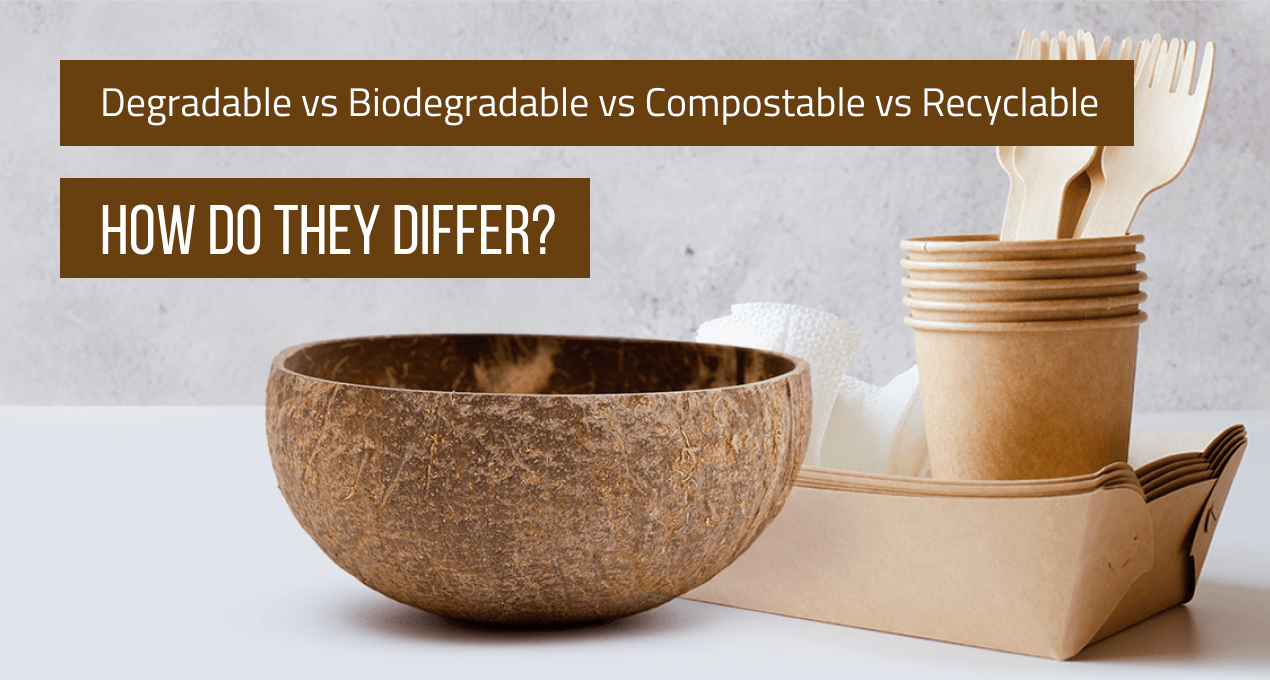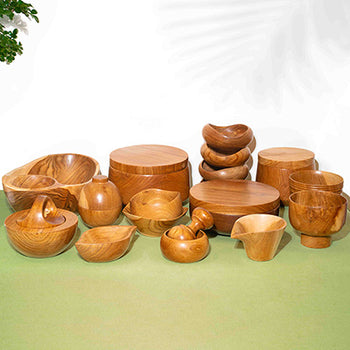Index
- Overview
- What Is Zero-Waste Living?
- Why Go Zero Waste?
- Zero-Waste Tips
- Take the 5 Rs to Heart
- Be Satisfied With What You Have
- Minimize Your Use of Energy
- Ditch Single-Use Plastic
- Give Waste a New Purpose
- Learn How to Compost
- Be a Conscious Consumer
- Find a Like-Minded Community and Get Involved
- Bonus: Zero-Waste Tips from a Rainforest Bowls Ambassador
- Patience Is Key

Zero-Waste Living for Beginners: Celebrating Zero Emissions Day
September 21 is the perfect day to “give our planet one day off”—better known as Zero Emissions Day. Zero Emissions Day, or ZeDay, started with the idea that simple yet collective choices can result in tremendous environmental change.
It’s about helping the world recharge for a day, giving it a break from carbon emissions. Also, ZeDay is a way to spark conversations about the harmful impacts of fossil fuel combustion at the same time raise awareness on more sustainable energy sources.
At Rainforest Bowls, we strive to promote sustainable living and ways to reduce our carbon footprint. To do this, we offer eco-friendly products, repurpose coconut shell waste and wood offcuts, and plant a tree for every product we sell.

To help you meaningfully celebrate Zero Emissions Day, we’ve rounded up some actionable tips on how you can celebrate this day all year round and gradually lessen your environmental impact through a lifestyle change: going zero waste.
If you want to lead a zero-waste life or simply reduce your carbon footprint, this guide to living with zero waste for beginners, along with zero-waste tips, can help you out.
What Is Zero-Waste Living?
You might have come across photos of people holding mason jars filled with trash on social media. If you haven’t heard of this yet, each of these jars represents these people’s yearly trash output.
Seems impossible, right?
But when you think about the growing zero-waste movement, this lifestyle doesn’t seem so far-fetched. Those people with trash-filled jars are part of this movement, and you can be too.

A zero-waste lifestyle means embracing sustainable choices by reducing consumption and, in turn, waste. Its primary goals are to prevent the depletion of resources and reducing the trash that ends up in landfills or incinerators.
Why Go Zero Waste?
Going zero waste for beginners is by no means an easy feat. Some might have given up along the way because of how unattainable it seems at first glance.
But remember: change doesn’t happen overnight. This rings true with living without waste in a world focused on producing more goods and therefore more waste.
That’s why it’s important to understand why you want to go zero waste. When you keep in mind the reasons why you want to switch to this lifestyle, it’ll be a lot easier to achieve. In other words, it’s high time to solidify your resolve to help create a better planet.
For the Environment
Journalists, ecologists, bloggers, and celebrities have been emphasizing the need for environmental change time and time again. Given the rising global temperature and worsening pollution, this call to action comes as no surprise.
According to the Environmental Protection Agency, a person produces 4.5 pounds of municipal solid waste, or the everyday items that we throw away, per day. That results in 3.5 million tons of solid waste produced globally—with the U.S. leading the charts, producing over 260 million tons of trash each year.

And we still haven’t weighed in the rising levels of greenhouse emissions caused by garbage disposal and the depletion of natural resources, which causes more pollution, deforestation, oil drilling, mineral mining, and so forth.
With industrialization and technological advancements comes our harmful impact on nature, resulting in a series of consequences—and grave ones at that.
From a wide range of diseases to the massive yet overlooked global warming, the effects of pollution and harming Mother Nature are a cause for alarm, which is why more and more people are switching to an eco-friendly, zero-waste lifestyle.
For the Community
Speaking of diseases, another reason why you should go zero waste is that it helps protect the health of your community. By bringing down the amount of pollution in water, air, and soil, you also bring down the amount of toxic chemicals that are detrimental to health.
Another way that zero-waste living improves your community is that it benefits the local economy. Recycling, sorting, and composting facilities create more jobs than disposal facilities do. Plus, zero-waste living helps out local carpooling, repair, tailor, and reuse businesses. Instead of going to waste, useful products, like clothing, furniture, and food, can be redistributed to those in need.

While businesses and government institutions have a key role in reducing waste and improving communities, it doesn’t hurt to start the change yourself. Remember that each person produces about 4.5 pounds of waste each day? With the right lifestyle choices, you can significantly contribute to the change the world needs.
For Yourself
As zero waste for beginners has grown in popularity, some people say stuff like, “Not #ZeroWaste, I’m just broke.” And while this zero-waste guide is focused on the environmental benefits of such a lifestyle, it also presents benefits to you (and your wallet).
How does zero-waste living lighten your wallet? Instead of purchasing new things, you can simply repair and reuse whatever you own.
Why buy a new watering can if you have a spare plastic bottle with a cap you can easily drill a hole into? Why pay extra for a single-use takeaway container when you can bring a reusable container to the restaurant? Or why purchase new expensive clothes when you can go to the thrift store to get used yet cheaper clothes?

Apart from financial benefits, zero-waste living also helps you be more content and mindful of what you have. No more spending on exorbitantly priced products, no more wanting for more. If zero-waste living has a mantra, it would be this: “To know when you have enough is to be rich beyond measure.”
Zero-Waste Tips
Zero waste for beginners can get extremely overwhelming. That’s why we’ve rounded up eight zero-waste tips to help you start your sustainable journey.
1. Take the 5 Rs to Heart
As was mentioned before, the zero-waste movement gained recognition worldwide when photos of people holding trash-filled jars popped up all over the internet. Bea Johnson, an author and speaker, pioneered that trend. She used a pint-sized “trash jar” to fit her family’s one year’s worth of trash.

In her book titled “Zero Waste Home: The Ultimate Guide to Simplifying your Life by Reducing your Waste,” she outlined the 5 Rs of zero waste, a more comprehensive and improved version of the traditional 3 Rs (reduce, reuse, and recycle).
Bea Johnson’s 5 Rs provided a relatively easy-to-follow zero-waste guide for beginners, and they include:
2. Be Satisfied With What You Have
There’s a fine line between minimalism and zero waste. And while these two are entirely different concepts, they have a fair share of similarities.
But let’s talk about their biggest similarity: reducing.
By not buying stuff you don’t need, there’s a less chance of you figuring out how to properly dispose of waste. It’s all about trying to live with what you already have and avoid bringing in more clutter. It saves you space, time, and money.

If you’re tempted to buy more, give yourself some time—a day or two or even a week—and reconsider. Then, see if you still think that you need to buy that item (you most probably don’t).
As Tyler Durden said in the movie Fight Club, “The things you own end up owning you.” Committing to a zero-waste lifestyle can benefit not only the environment but also you, in a philosophical sense.
3. Minimize Your Use of Energy
When you think about zero waste for beginners, the first thing that comes to mind is reducing trash that ends up in landfills. This isn’t wrong at all, but there’s a factor that’s often overlooked in such a lifestyle: energy consumption.
Zero waste is a broader concept than trash jars. It’s a reminder that we have to lessen our carbon footprint, harmful consumption, and pollution, including toxic gases found in the air.

Each year, the U.S. electric power industry releases almost 1.9 billion metric tons of carbon dioxide into the atmosphere. Power plants burning fossil fuels, coal, and petroleum contribute to 99% of electricity-related carbon emissions. Moreover, 80% of the electricity consumed comes from non-renewable resources.
So not only does our use of electricity result in air pollution—it also depletes our natural resources.
While not everyone can afford solar panels, wind turbines, and other renewable energy sources, everyone can try to reduce their energy consumption in simple ways. These include unplugging unused electrical devices, turning off lights when not in use, and making the most of sunlight as your source of lighting.

Apart from this, it’s worth considering that cars, from their production to fuel consumption, also pose a problem of air pollution. So you might want to try carpooling, riding a bike, or avoiding driving your car when there are other more eco-friendly alternatives available.
4. Ditch Single-Use Plastic
Living plastic-free is certainly an ideal world for eco-minded people, but it’s easier said than done. Plastic is sturdy. Plastic is cheap. Plastic is everywhere.
But when you start to be conscious of every purchasing decision, living without plastic gradually becomes easy.
For instance, you can carry your own reusable glass containers for takeaways instead of having the restaurant pack them in disposable tupperware. When you’re grocery shopping, you can bring your own reusable grocery bags rather than storing your groceries in single-use plastic bags. When you’re planning to buy online, you can ask the seller if they offer plastic-free packaging and delivery.
 Photo by Rebecca Espinal @rkespinal
Photo by Rebecca Espinal @rkespinal
Rainforest Bowls packs and delivers eco-friendly products using recycled and biodegradable paper packaging. When you order from us, you can enjoy the fact that you’re helping us reach our eco-goals—all without contributing to plastic pollution.
5. Give Waste a New Purpose
One of the best ways you can ensure that your waste doesn’t end up in landfills for years is to know how to properly recycle it.
Typically, recycling facilities need homeowners to clean plastic bottles and other recyclable materials before throwing them into the recycling bin. You can check with your local recycling facility to learn what it accepts and what it doesn’t.
 See our article on the differences between degradable, biodegradable, compostable, and recyclable to learn how to properly segregate your waste.
See our article on the differences between degradable, biodegradable, compostable, and recyclable to learn how to properly segregate your waste.
Another great way to reduce trash in landfills is to recycle it, and that requires some basic DIY skills. In other words, it’s time to get creative.
If you happen to have several old tires, you can turn them into planters or swings. Or if you have a plastic bottle lying around, you can cut and hang it and turn it into a bird feeder.
Lastly, you can give a new purpose to waste by finding treasure in one’s trash, so to speak. Shop for secondhand clothes in thrift stores or join social media groups giving away used stuff in your area rather than buying new things.
Rainforest Bowls aims to reduce waste by reclaiming coconut shells, which usually end up in landfills or burned in incinerators. Thanks to the artisans in Vietnam, these coconut shells are handcrafted into natural bowls for kitchens.
6. Learn How to Compost
When you have composting all down pat, you’ll be surprised about how much waste you’ve managed to eliminate. Composting can be intimidating at first, what with all the different methods you can use. But it all boils down to the method that best suits your needs.
Whether you opt for closed or open bins, vermicomposting, or pit composting, turning food scraps and other compostable materials into fertilizers can be rewarding. You won’t need to buy commercial fertilizers, and you’ll be more encouraged to grow your own garden.
If you think you don’t have the time to compost, you can find a community composting garden near you and have them turn your food scraps into food for the soil.

Did you know that our reusable bamboo straws are completely compostable? That makes these zero-waste products a great alternative to single-use plastic! Just cut them into pieces and toss them into your compost bin. They’ll naturally break down as organic matter.
7. Be a Conscious Consumer
Yes, one of the principles of zero-waste living is to reduce your consumption. At times, however, it’s inevitable to avoid buying altogether.
For this reason, it’s important to be mindful of your purchases. Is the company you’re buying from practicing sustainability? Are they using plastic packaging? Does their business process create a lasting environmental impact?
If it’s possible, try doing your research first before making a purchase. Doing so can help you find the best zero-waste products out there.
At Rainforest Bowls, we make sure that each of our zero-waste products is sourced and made sustainably. We repurpose coconut shell waste, offer all-natural and eco-friendly products, and use recycled paper packaging. Plus, for every zero-waste product we sell, we donate to an environmental charity to have one tree planted!
8. Find a Like-Minded Community and Get Involved
Be they friends, family, online groups, or local community members, it’s best to have a support group of like-minded people. That way, you can discuss zero-waste tips, have a helping hand while practicing the 5 Rs, and be more encouraged to live life without waste. Plus, by getting involved in your community, you can inspire and educate other people about the benefits of zero-waste living.
Bonus: Zero-Waste Tips from a Rainforest Bowls Ambassador
What’s great about Rainforest Bowls Ambassadors is that they align with our goals and advocacies, including minimizing waste and living a sustainable lifestyle. Here are some helpful zero-waste tips from one of our lovely ambassadors:
Kelsi Viau
Instagram: @wavelengths.coaching, @kelkiiiii
Website: www.wavelengthscoaching.com

- Reduce, reuse, recycle!
- Save household items that can be used for their same purpose or another.
- Ditch plastic and aluminum
- Research all the chemicals found in household and self-care products. Opt for a plant-based cleaner or something you can make at home! (Vinegar will become your best friend!)
- Use your creativity and experiment with different recipes that are plant-based!
Patience Is Key
Again, real change doesn’t happen overnight, especially when it comes to zero waste for beginners. Being patient with yourself is an essential factor in living a life without waste.
Taking the first step toward zero-waste living is already a huge step toward helping save the environment.

Surround yourself with people and things that remind you of the benefits of zero-waste living. Check out our collection, get eco-friendly, zero-waste products for your home, and get motivated about living without waste!






